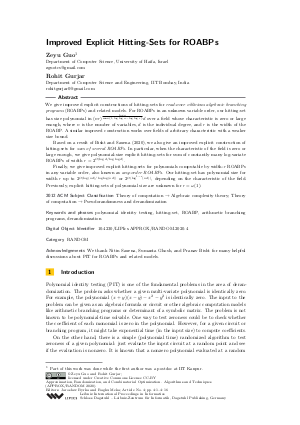@InProceedings{guo_et_al:LIPIcs.APPROX/RANDOM.2020.4,
author = {Guo, Zeyu and Gurjar, Rohit},
title = {{Improved Explicit Hitting-Sets for ROABPs}},
booktitle = {Approximation, Randomization, and Combinatorial Optimization. Algorithms and Techniques (APPROX/RANDOM 2020)},
pages = {4:1--4:16},
series = {Leibniz International Proceedings in Informatics (LIPIcs)},
ISBN = {978-3-95977-164-1},
ISSN = {1868-8969},
year = {2020},
volume = {176},
editor = {Byrka, Jaros{\l}aw and Meka, Raghu},
publisher = {Schloss Dagstuhl -- Leibniz-Zentrum f{\"u}r Informatik},
address = {Dagstuhl, Germany},
URL = {https://drops.dagstuhl.de/entities/document/10.4230/LIPIcs.APPROX/RANDOM.2020.4},
URN = {urn:nbn:de:0030-drops-126076},
doi = {10.4230/LIPIcs.APPROX/RANDOM.2020.4},
annote = {Keywords: polynomial identity testing, hitting-set, ROABP, arithmetic branching programs, derandomization}
}

 Creative Commons Attribution 3.0 Unported license
Creative Commons Attribution 3.0 Unported license


